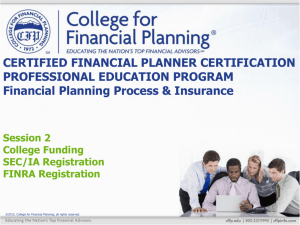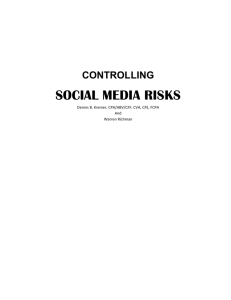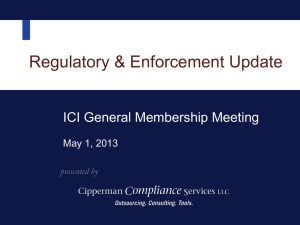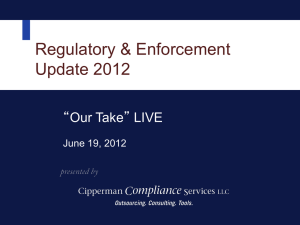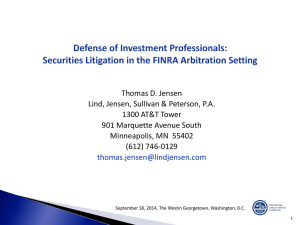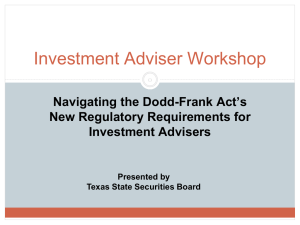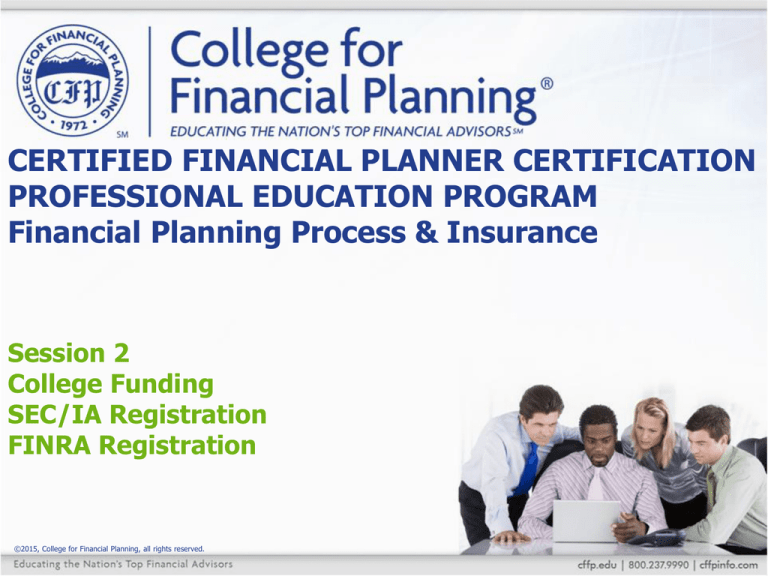
CERTIFIED FINANCIAL PLANNER CERTIFICATION
PROFESSIONAL EDUCATION PROGRAM
Financial Planning Process & Insurance
Session 2
College Funding
SEC/IA Registration
FINRA Registration
©2015, College for Financial Planning, all rights reserved.
Session Details
Module
1
Chapter(s) 8
LOs
1-8
Identify sources and strategies for funding a
college education.
2-2
College Funding (CESAs vs. §529 Plans)
Similarities between the two plans:
•
•
Neither is federally tax deductible.
•
Both allow tax-deferred accumulation and taxfree withdrawals for qualified education
expenses.
•
CESA and §529 plans allow the following
expenses:
Both can be undertaken simultaneously and
treated as parent assets for financial aid.
o
o
o
o
o
tuition (paid directly to the institution)
room and board (paid directly)
fees (as required)
books, supplies, and equipment
(including computers)
expenses of special-needs beneficiary
needed for enrollment at eligible
institution
2-3
Penalties
•
•
•
•
•
•
Withdrawals are tax free for QUALIFIED HIGHER EDUCATION
EXPENSES (QHEE).
Any tuition expense used to generate American Opportunity Tax
Credit or Lifetime Learning Credit reduces that amount of QHEE.
Any amount beyond that is considered a non-qualified distribution.
Either you or the beneficiary receive money
reports as earnings as taxable income and
10% penalty.
If distribution is within 60 days, roll it
into a different 529 plan to avoid the
penalty or pre-pay next year’s expenses.
CESA also has a 6% excise tax on
excess contributions per beneficiary
so coordinate with relatives.
2-4
Unique Features of the Coverdell (CESA)
•
•
contribution limit of $2,000 per year
•
AGI phaseout levels $190,000 to $220,000 (MFJ
returns)
•
must be used prior to age 30
contribution deadline is tax filing date for the
year (extensions NOT included)
assets deemed distributed 30 days after
beneficiary turns 30.
o may be subject to tax and penalties
assets for qualified elementary and secondary
education (includes tuition, public or private
schools, grades K-12, computers, and
educational software)
o
•
•
More flexibility in investment types of securities
and fund contributions (mutual funds, individual
stocks, or bonds)
•
can be rolled into 529 plan
2-5
Unique Features of §529 Plans
•
•
•
contribution limits set by state, some up to $360,000
•
married couples may contribute up to $28,000 per year or $140,000 lump sum for
first year
•
•
no age limit on use of §529 assets
•
portfolio administered by investment company for
state offering §529 plan
•
assets may only be invested in portfolios offered by
the state-sponsored plan
•
portfolios can be changed once every 12 months or
after change of primary beneficiary
•
many states offer state tax deduction
no income limit for contributors
annual contributions up to $14,000 or lump sum of $70,000 in year 1 of 5-year
period avoids gift tax
§529 assets for use only on eligible expenses at accredited
public or private colleges/universities
2-6
For Consideration
•
•
•
•
•
•
•
amount being contributed
number of people contributing
transferability to other beneficiaries
investment choices
investment fees & account fees
college only or all education expenses
state tax deduction
2-7
Session Details
Module
2
Chapter(s) 1
LOs
2-1
2-2
Determine whether an individual must register
with a regulatory body.
Identify the responsibilities of persons who are
classified as registered investment advisers.
2-8
FINRA and/or SEC Registration
•
•
•
SEC registration is required if you advise.
FINRA registration is required if you sell.
These statements will help you remember:
o
o
o
An individual may perform activities
requiring registration as an investment
adviser that may not require FINRA
registration.
An individual may be required to register
with FINRA but not with his or
her state or the SEC.
An individual may be required to
register with both FINRA and
the SEC (or his or her state).
2-9
Who is an “Investment Adviser”?
The three-pronged test
(or the A-B-C test):
1. Provides Advice or
analyses concerning
securities
2. Is in the Business of
providing investment
advice
3. Receives Compensation
for services
Yes to all three, registered
you must be!
2-10
Form ADV & the Investment Adviser
Advisers who must register:
• fill out form ADV
• must be done electronically using IARD
• Part I is general information
• Part II a more detailed
form enumerating:
o fee structure
o services offered
o possible conflicts
o information on
business associates
2-11
Investment Adviser Exceptions
Exceptions are not considered advisers under
the act (do not have to register with the SEC):
• any bank or bank holding company
• any lawyer, accountant, engineer, or teacher
(advice incidental to the practice of the profession)
• broker or dealer (advice incidental to the conduct of
business without special compensation)
• the publisher of newspapers or journals of general
and regular circulation
• a person whose advice is limited to U.S.
government-issued or guaranteed securities
• other persons not within the intent of SEC law
2-12
Investment Adviser Exemptions
Exemptions are considered to be advisers
(but they do not have to register):
• clients are all residents of the state that is the adviser’s principal
•
•
•
•
•
place of business; provides advice only on securities not listed on
national securities exchanges; no unlisted trading privileges on
national securities exchanges
only clients are insurance companies
fewer than 15 clients during last 12 months, and don’t hold
themselves out as investment advisers or act as advisers to any
investment company registered under Investment Company Act of
1940
charitable organizations or donative instruments
provide advice to a group plan solely for benefit of church
employees or related 501 organizations
registered commodity futures trader whose primary business is not
that of providing advice
2-13
Federal or State Registration
Federal (SEC: • meets definition of an adviser
Securities and • manages $150 million or more of client funds*
• no state registration available
Exchange
*with direct, continuous management of $100 million-$150 million may
Commission)
have some flexibility about where to register (SEC or state)
State
• meets definition of an adviser
• manages less than $100 million of client funds
• state where adviser is a nonresident may not
impose greater requirements than state of residence
Separately
Managed
Accounts
(SMAs)
• individualized portfolios of assets
• professional management; input from investor
• between $100 million and $150 million must register
with SEC
2-14
FINRA Registration
If you sell products in the following ways (and there are many
more), you must be registered with FINRA:
Series 3
• National Commodities Futures
Series 6
• Investment Company/Variable Contracts Limited Rep.
Series 7
• General Securities Registered Representative
Series 22
• Direct Participation Programs Limited Representative
Series 24
• General Securities Principal
Series 55
• Equity Trader
Series 62
• Corporate Securities Limited Representative
Series 63
• Uniform Securities Agent State Law Exam
Series 65
• Investment Adviser Examination
Series 66
• Investment Adviser/Registered Representative Combination Exam
2-15
FINRA Registration & the IA
• FINRA registration does not necessarily comply with the
•
•
•
Investment Advisers Act.
An individual may perform activities requiring
registration as an investment adviser that may not
require FINRA registration.
An individual may be required to register with FINRA
but not with his or her state or the SEC.
Both forms deal with securities, but they are mutually
exclusive in their application.
2-16
Question 1
Which of the following are features that are shared in
common between the Coverdell Education Savings
Account and the Section 529 plans?
I. Both have an income phaseout.
II. Both have an age restriction for use of funds.
III. Neither one of the plans provides any federal
income tax deductibility to contributors.
IV. Both can be undertaken simultaneously.
a. I and II only
b. I and IV only
c. II and III only
d. III and IV only
2-17
Question 2
Which one of the following statements about
FINRA and SEC registration is incorrect?
a. An individual may perform activities requiring
registration as an investment adviser that may not
require FINRA registration.
b. An individual may be required to register with
FINRA but not with his or her state or the SEC.
c. An individual may be required to register with both
FINRA and the SEC (or his or her state).
d. The SEC and FINRA are governmental agencies that
register investment advisers.
2-18
Question 3
Which one of the following is not in the category of
being “exempt from registration” as an investment
adviser under the Investment Advisers Act of 1940?
a. an intrastate adviser in unlisted securities
b. a publisher of a bona fide newspaper or financial
publication of general and regular circulation
c. an adviser whose only clients are insurance
companies
d. a private adviser who (1) during the previous 12
months had fewer than 15 clients; (2) does not hold
himself or herself out generally to the public as an
adviser; and (3) does not act as such for a
registered investment company
2-19
Question 4
Karen Manchego has made an excellent living by selling the
stock of small local companies. She sells only to investors in
her state, and none of the companies whose stock she sells
are big enough to be listed on any exchange. She makes
specific recommendations about the stock to all of her 250
clients, and the companies pay her a commission when she
sells their stock. She sells about $40 million in shares each
year.
Should Karen register as an investment adviser?
a. No, Karen does not need to register because the stock
she sells is unlisted and all her clients live in her state.
b. Yes, Karen should register in her state.
c. Yes, Karen should register with the SEC.
d. No, Karen does not need to register because she does
not hold herself out as a financial planner.
2-20
CERTIFIED FINANCIAL PLANNER CERTIFICATION
PROFESSIONAL EDUCATION PROGRAM
Financial Planning Process & Insurance
Session 2
End of Slides
©2015, College for Financial Planning, all rights reserved.

